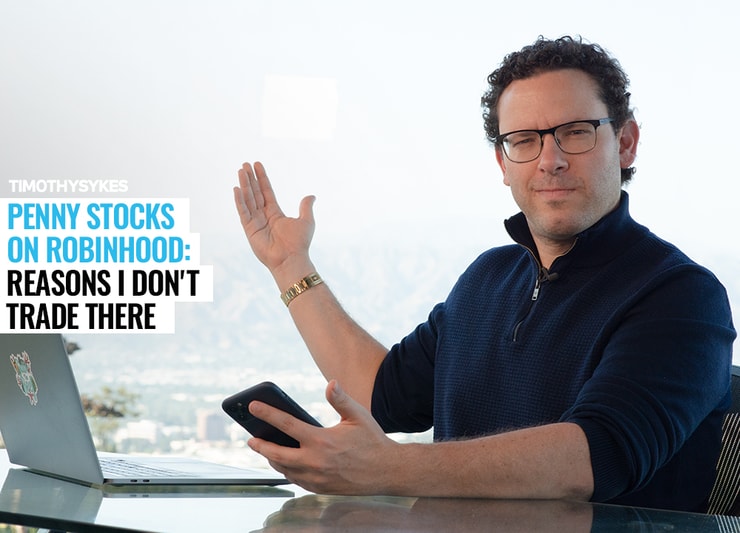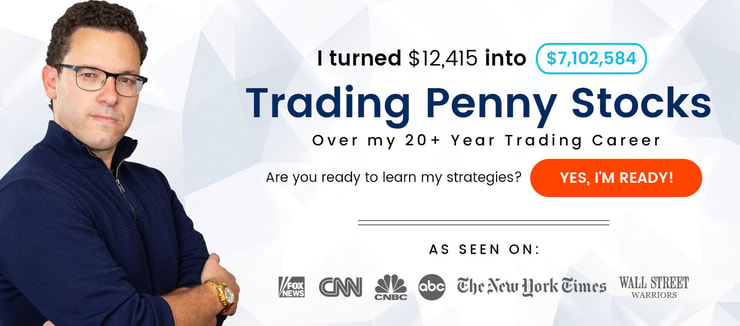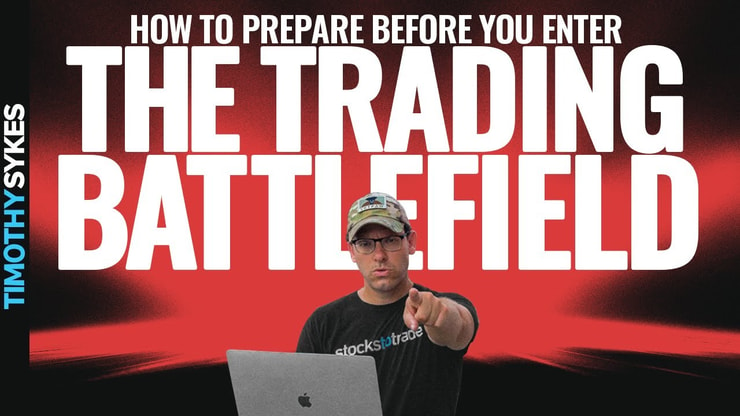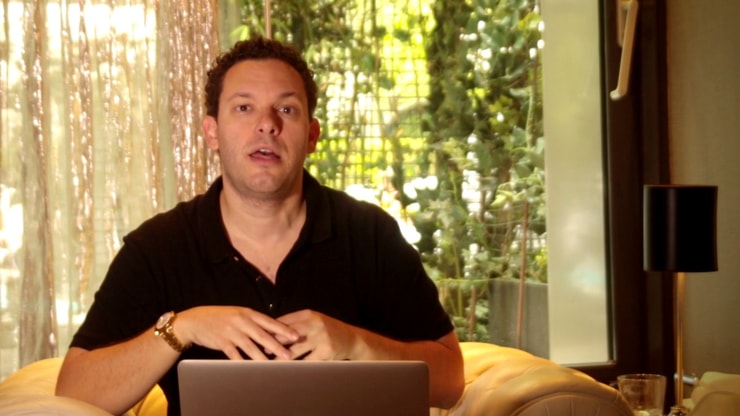Although I’ve made my stance clear, I still get a lot of questions about using Robinhood for penny stocks.
If you’re looking for a broker, you want to find the best fit for your strategy and account, right? Robinhood’s offer of no commissions and free stock might sound enticing.
I wouldn’t fall for the bait. And if you want to use Robinhood for penny stocks trading, there’s a key fact you should know…
There’s a lot to consider before you choose a broker.
Over the years, I’ve used dozens of brokers. I’ve tried brokers for shorting, some with cheap commissions, and the ones with the highest fees.
I don’t get paid by any brokers that I use. The broker you choose is your business. I’m just here to help you understand how to make better choices for yourself.
If you’ve come to me for guidance on the best platform for penny stocks, you’re partially in luck. This Robinhood review will tell you why I think it’s better to look elsewhere.
Table of Contents
- 1 Are There Penny Stocks on Robinhood?
- 2 Is Robinhood Good for Penny Stocks?
- 3 What Are the Downsides of Trading Penny Stocks on Robinhood?
- 4 What’s the Truth About Free Penny Stocks on Robinhood?
- 5 How to Find Penny Stocks on Robinhood
- 6 Are There Any Penny Stocks You Should Watch on Robinhood?
- 7 Why I Don’t Trade Penny Stocks on Robinhood
- 8 Frequently Asked Questions About Robinhood Penny Stocks
- 9 Trading Challenge
Are There Penny Stocks on Robinhood?
Robinhood is an online broker that’s been around since 2013. They branded themselves as a commission-free broker and brought in waves of traders. 2020 has been especially good to them.
A lot of these new users on Robinhood are the penny stock newbies you’ll find all over Reddit. These Robinhood fans hype penny stocks all day in Discord chat rooms…
But they clearly don’t get why penny stocks are attractive.
So let’s clear the air on what penny stocks are. These are stocks that trade for $5 per share or less. This includes OTC pink sheets trading at a fraction of a penny and Nasdaq stocks trading at $4.99.
But Robinhood users miss out on a big part of penny stocking. They can’t buy penny stocks that list on the OTC markets. These are the stocks I’ve made millions on.*
When it comes to using Robinhood for penny stocks, I guess that many newbies on the platforms don’t know what OTC stocks are. If they did — and understand the potential in this niche — they’d probably look for another broker.
But I’d bet the Robinhood penny stock fans on Reddit would argue anyway.
Now, let’s get this nagging question out of the way…
(*These results are not typical. Individual results will vary. Most traders lose money. My top students have the benefit of many years of hard work and dedication. Trading is inherently risky. Always do your due diligence and never risk more than you can afford to lose.)
Is Robinhood Good for Penny Stocks?

I trade and teach people to trade penny stocks. Although they can be risky, they can potentially help grow small accounts quickly … As long as you ignore the hype, focus on the process, and aim for singles every trade.
I get that Robinhood’s commission-free platform sounds great for traders with small accounts. But don’t be fooled by commission-free brokers. They gotta get money somewhere…
Robinhood allegedly saves money by selling their order flow. And from what I hear, its execution speed doesn’t stack up to the competition. To me, that’s two big counts against trading penny stocks on Robinhood.
When you’re dealing with penny stock volatility, slow executions can cost you big.
(If you don’t know why volatility can be a good thing, check out my NO-COST “Volatility Survival Guide.” It’s essential for unpredictable markets like 2020.)
But the main reason I wouldn’t recommend Robinhood for penny stocks is because you can’t access the OTC markets. That’s where you’ll find some of the biggest gainers in the penny stock world.
To all those using #Robinhood and #webull missing out on the absolutely amazing runups on $ALYI $AABB $BBRW $BRTXQ $IGEN $AXXA $SITS $ZICX $WKSP wake the hell up & realize you’re missing out on the plays that can truly grow your account EXPONENTIALLY! Read https://t.co/Ens8xBEzdW
— Timothy Sykes (@timothysykes) August 31, 2020
What Are the Downsides of Trading Penny Stocks on Robinhood?
Let’s get to the meat.
Robinhood stock trading is popular among newbies … until they learn better.
So what’s less than ideal on Robinhood, in my opinion?
Premarket and after-hours trading is very limited. I don’t necessarily trade much at those times either. It’s not very liquid, and I like to be able to get in and out of a position quickly. I never recommend it for newer traders. But I like to have the option.
But here’s the kicker: OTCs have been hot this year. And if you’ve been trading stocks on Robinhood, you’re missing these opportunities. You can’t trade OTC stocks on Robinhood. That’s an entire group of volatile penny stocks you can’t touch with this broker.
If you follow any of my patterns or my Profit.ly profile, this is a massive limitation. Why limit your opportunities from some of the hottest patterns and trades?
And I hear horror stories from students about bad executions. This can lead to massive losses in the long run. I just don’t think it’s worth it.
If you want to be in this game for the long haul, treat it like a business. Making random trades from a limited pool of penny stocks on your phone? I know you can do better.
Start building a better foundation for approaching the markets with my 30-Day Bootcamp. You go from basics to patterns and beyond in just 30 days. Get in my Bootcamp now!
What’s the Truth About Free Penny Stocks on Robinhood?

Robinhood free stocks are the budget broker equivalent of a free lunch. And as those of us with old-school parents know, there’s no such thing as a free lunch.
Again, it’s crucial to read the small fine print. Robinhood claims you can get a free stock with a value of up to $200. What are the actual chances of that? Let’s check out Robinhood’s free stock distribution under its terms and conditions:
- There’s a 98% chance of the stock bonus having a value of $2.50–$10
- Approximately a 1% chance of the stock bonus having a value of $10–$50
- And approximately a 1% chance of the stock bonus having a value of $50–$200
WOW!
So maybe you save $10 in commissions and get a $10 ‘free’ stock … But think how quickly that could all be wiped out by one terrible execution.
Remember, you get what you pay for…
How to Find Penny Stocks on Robinhood
It’s essential to prepare and use the right tools in trading. Doing both won’t guarantee you anything … except understand the market better and make smarter trading decisions.
On Robinhood’s main page, there are ‘Popular Lists’ and ‘Top Movers’ with a number of stocks to fit those categories.
The problem?
Too many new traders have no idea how to trade them. There are no scanners on Robinhood’s platform, so you can be tempted to trade stocks they select.
That’s not how I trade or what I teach. I’ve made over $6 million trading penny stocks. I have six millionaire Trading Challenge students and many more in the six figures.*
None of us got to where we are today by following someone else’s stock picks. You have to be self-sufficient and learn to think for yourself. Use the right tools for the job.
I use StocksToTrade. I helped design this trading and scanning platform to suit my penny stock strategies. I use this tool every day to find the hottest stocks to trade. It has 40+ built-in scanners, excellent charts, and so much more.
And the other part of trading? You need a strategy that suits you. Start with my 30-Day Bootcamp so you can learn the market basics, and quit chasing random stocks.
Are There Any Penny Stocks You Should Watch on Robinhood?
I constantly run scans looking for stocks that fit my patterns. I don’t look for stocks that I can buy through my broker.
Your broker exists to help you trade the stocks you want to trade. A good broker shouldn’t get in the way of a good trade.
Why I Don’t Trade Penny Stocks on Robinhood
Why don’t I trade on Robinhood? I’ve found brokers that better suit my needs. You need to do the same. I can’t tell you which broker to use. That comes down to your strategy and needs. But solely picking a broker for no commissions? Dig deeper.
I think brokers like Robinhood lures newbies in with gamified platforms. Trading is not a game. And it turns out, there’s a cost for commission-free trading.
There are no shortcuts in the stock market. Anyone who says there is? They’re full of BS. I’m here to teach you what I’ve learned in over 20 years of trading. It’s one way you can prepare for battle in the markets.
Remember trading is a fucken battlefield, so many snowflakes the unethical promoters & Robinhood just use & throws out because they weren’t prepared for the harsh realities of financial warfare. I’m NOT here to be your friend, I teach to ensure your survival/to help you succeed!
— Timothy Sykes (@timothysykes) October 14, 2020
Too many people show up on this battlefield with a butter knife. Learn this now:
The market doesn’t care about you, what you think, or what you want. And it definitely doesn’t owe you anything.
Go in with your eyes open and have a well-conceived trading plan. Be prepared for battle in an industry full of scammers!
Newbie traders beware. And if you want to short on Robinhood, there’s more bad news…
Can You Short Sell on Robinhood?
Nope. To short, you sell borrowed shares from a broker. You then buy to cover to close your position and return the shares to your broker.
I don’t recommend that new traders try to short sell. It’s highly risky, especially in unpredictable markets.
Too many newbies blindly short any penny stock that’s up. What they don’t realize is that this hype-driven short volume can lead to a short squeeze. If you don’t cut losses quickly, you can actually lose more money than you place on a trade.
I don’t short much these days. But some of my students do, and it’s not possible through Robinhood.
If you’re serious about making trading work for your life, be serious about the tools you use. That includes your brokers. Do the research to find the one that best fits your strategy. And I’ll warn you now: there’s no such thing as a perfect broker.
I use E-Trade and Interactive Brokers. No, I’m not paid by them to tell you that. That’s just who I use. I think they just suck the least.
In an industry full of scammers, I put my money where I feel it’s the safest. I encourage you to do the same.
Frequently Asked Questions About Robinhood Penny Stocks
Can You Actually Make Money Trading Penny Stocks?
The short answer: yes. A broker is your vehicle, but you're in the driver’s seat. No matter how good or bad your broker is, you have to study, prepare, and know how to make intelligent trades.
More Breaking News
- BigBear.ai Stock Surges: What’s Driving the Gains?
- INSW Set to Join S&P SmallCap 600: What Does This Mean for Investors?
- Astera Labs Inc.: Will the Latest AI Advances Fuel a Market Boom or Pop the Bubble?
Is the Robinhood App Legit?
Robinhood’s streamlined app is one of its main draws. I think it’s one reason so many newbies are drawn to this broker. I think it makes trading seem like a video game … But when you blow up your account, it’s much tougher to come back.
Is Robinhood Good for Beginners?
Robinhood may be popular with newbie traders, but that doesn’t mean I think it’s good for them. Less than best executions, limited stock selection, and poor customer service are some of the reports I hear from traders. If you’re serious about trading, do your research before choosing a broker.
How Do I Get My Money out of Robinhood?
It’s just like any other broker. You simply wait for your funds to settle and transfer your money to your linked bank account.
Trading Challenge
I started my Trading Challenge so I could shine a light on the dark world of penny stocks.
I LOVE penny stocks. I’ve made millions trading them.* But I had to learn everything I now know on my own. It was harder than it should have been. I think everyone should have the opportunity to find financial freedom … as long as they’re willing to put in the work.
It doesn’t come easy. But I can help you learn this niche faster by sharing what I’ve learned in 20+ years of trading and 10+ years of teaching.
Ready to take your trading to the next level? Join an awesome community of dedicated traders who believe in sharing knowledge. Apply for my Trading Challenge.







Leave a reply